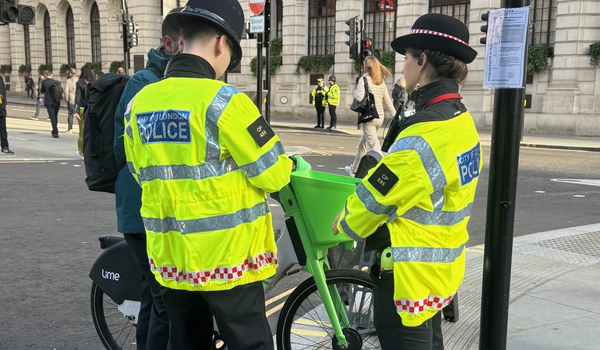City of London Police launches summer ‘safer streets’ campaign
Nearly 300 cyclists have received fixed penalty notices for going through red lights so far this year, more than ten times the number of motorists clocked for the same offence.
Since the start of 2025, 284 cyclists received a fine for not stopping at traffic lights. For the same period, 25 motorists were ticketed for the same offence.
The data has been released as the force launches its summer campaign ‘Safer City Streets’. The campaign focuses on offences that matter to communities, such as anti-social behaviour (ASB) and phone snatching and the force is using intelligence-led policing to target areas where crime and ASB happen.
Cycling in the City of London has increased by more than 50 per cent in the past two years, according to data captured by the City of London Corporation. The increased number of cyclists in the City has led to growing calls from pedestrians, motorists and cyclists themselves for action to be taken. The force’s cycle team is using data and information from the public to target patrols at red light-jumping roads.
Proactive action by City of London Police to prevent phone snatching this year has seen a nearly 30 per cent reduction in the crime. Under Operation Swipe, officers patrol phone-snatching hot spots to deter, detect, apprehend thieves and prevent phone theft.
To hammer home the message for residents and workers to look up and look out for phone snatchers, blue plaques have been placed on the ground where phones have been snatched. The force is also offering free phone marking to help assist getting devices back to owners if police find them.
Separately, the campaign will also focus on additional hot-spot patrols in areas where violent and anti-social crime are most likely to occur, helping to creating safer spaces for residents and communities.
Analytics show that a quarter of violence offences against the person happen in less than two per cent of the City streets. More than 11,000 hours of additional patrols were carried out last year, reducing serious violent crime and leading to over 250 arrests.
Commissioner Pete O’Doherty said: “Our flagship Safer City Streets prevention campaign is about listening to what matters to our communities – whether it is ASB, phone snatching, or dangerous road use – and taking clear, visible action. Our new three-year policing plan details our determination to reduce the harm caused by high-volume crimes.
“Our teams are out every day with our dedicated ward officers becoming a regularly and recognisable face to local residents and businesses. We’re also one of the few forces in the country where scenes of crimes officers go to every incident where forensics can be recovered. This is how we as a police force are going the extra mile to support victims and reduce crime.
“Targeted and intelligence-led hotspot policing, with increased officer patrols funded, is creating safer streets for people who live, work and visit the Square Mile.”
The Hotspot Action Fund (HAF) is a Home Office-funded initiative aimed at tackling violence, knife crime and ASB in the areas most affected across the Square Mile.
The force was allocated £1 million for last year and a further £1 million this financial year; the fund supports a blend of high-visibility patrols and problem-oriented policing to address both the symptoms and root causes of crime.
The offences the force are targeting under the scheme are:
- Violence in the night-time economy;
- Sexual offending;
- Rough-sleeping-and-begging-related crime and ASB;
- Robbery of personal property including phone snatching; and
- Shoplifting and business robbery.
Dr Spencer Chainey, Professor at UCL’s Jill Dando Institute of Security and Crime Science, said: “Over the last six months, we’ve been working with the City of London Police to better equip them in identifying hot spots and problem-oriented policing to address the crime challenges in the City.
“Hot spot policing involves the targeted deployment of high-visibility foot patrols to the places where crime is known to concentrate, whilst the problem-oriented approach involves developing solutions that get at the conditions that make crime conducive in high crime areas.
“Our work with the City of London Police will continue and we’ll be keeping track of their developments so that the City becomes an even safer place to live, work and visit.”
Tijs Broeke, chair of the City of London Police Authority Board, said: “People want to feel safe on our streets whether they’re walking to work, cycling through the Square Mile, or just enjoying the City.
“This campaign is about action. We’re listening to the concerns of residents and workers on issues like phone snatching, anti-social behaviour and reckless cycling, and taking clear, visible steps to tackle them.
“By combining intelligence-led patrols, smart enforcement, and community engagement, we’re focused on prevention and results. It’s about keeping crime down, supporting victims, and making sure the City stays one of the safest places in the country.”


